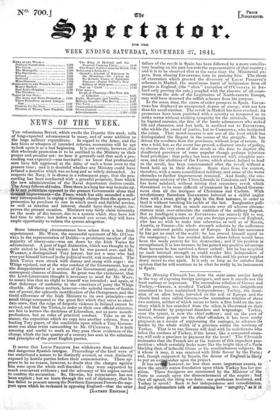Some interesting circumstances have arisen from a late Irish appointment.
Mr. WEST, the successful opponent of Mr. O'Cos- WELL in the representation of Dublin—a prominent member of the majority of ninety-one—was set down by the Irish Tories for advancement. A post of legal distinction, which was thought to be quite suited to him, fell vacant : but he was passed over, and Mr. WARREN, a distinguished Tory lawyer, but not a man who had ever put himself forward in the political world, wali nominated. The Irish Tories were struck with dismay and stung with anger : the Whigs rejoiced, not at the wise conduct of the Government, but at the disappointment of a section of the Government party, and the consequent chances of disunion. So great was the excitement, that the Lord-Lieutenant thought it necessary to send for Mr. WEST, to assure him that no slight to himself was intended ; and again, at that deference of authority to the exactions of party the Whigs chuckle. All these matters, however—the spiteful sneers of faction out of power, the splenetic mortification of the Orangemen, and the timid adherence of the Irish Ministry to its own principles—are small things compared to the great fact which they serve to eluci- date anew, that the reign of despotic violence in Ireland cannot be revived, and that the Tories, in order to their own official existence, are fain to borrow the doctrines of Liberalism, not as mere mouth- professions, but as rules of practical conduct. Take as an in- stance, the exposition which we copy into another column, from a leading Tory paper, of the conditions upon which a Tory Govern- ment can alone resist succumbing to Mr. O'Cosscrx. It is both amusing and useful to mark as they pass these evidences of the change which the last quarter of a century has seen in the relations mid principles of the great English parties.


























